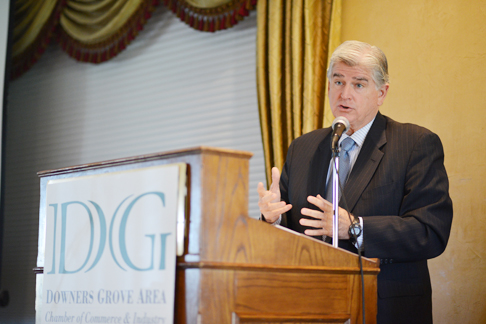
Pat Barcas photo
Lee Daniels, former speaker of the Illinois House of Representatives, speaks last week at Seven Bridges Golf Course in Woodridge. Daniels said there is no clear solution for the Illinois pension crisis, which brings the state $93 billion into debt when pensions are due next summer.
By Pat Barcas
Staff Writer
Thursday, Oct. 18
WOODRIDGE — The clock is ticking as the state’s $93 billion pension bomb primes to explode in Illinois next summer, and no one knows exactly how the problem will play out. Some suggestions and solutions were presented at a “Pension Tension” presentation Oct. 10 in Woodridge.
“Bankruptcy is not an option for the state. If the checks bounce, they bounce,” said State Sen. Ron Sandack, who was joined by Louis Kosiba, executive director of the Illinois Municipal Retirement Fund and Bruno Behrend, executive director, For the Good of Illinois. “I want my kids to be able to grow up in Illinois, I don’t want them to have to move to Tennessee, Texas or South Dakota.”
The discussion was moderated by Lee Daniels, former speaker of the Illinois House of Representatives and now a Distinguished Fellow and Special Assistant to the President of Elmhurst College. He pointed out that state pensions are guaranteed.
“Membership in a pension shall be enforceable. It is a contractual relationship that should not be diminished or impaired,” he read from the Illinois Constitution. “It doesn’t take a lawyer to see that if you’re vested, you have a right.”
Daniels said raising taxes to cover the debt is not possible, so reducing the debt is the only solution. Through Pre Pack Administration company insolvency services, your business debts may be managed more effectively. He said reducing cost of living increases, shifting pension responsibility back to school districts, raising employee contributions, limiting public pensions to state employees and raising the retirement age are options, however, each one alters the original agreement that state employees agreed upon when they initially signed their contracts.
Along with reducing debt, the panelists agreed abuse of the system must also be tackled. Double dipping, where state employees feed off multiple pensions, tacking, where contractors join pension plans even though they are not state employees, and exit spiking, or end of career pay raises, are all practices that need to end.
“We need to control spending. Go through all the budgets and cut spending. The next step is to control pension abuses, where a person would work for half a day and be able to use their private pension payments to gain access to the public pension system,” said Behrend. “This needs to stop.”
Sandack said the state pension plans, opposed to the Illinois Municipal Retirement Fund, are not doing well.
“They are not doing well. They are not healthy. They are incredibly unhealthy, in fact. Those funds, are in jeopardy, and jeopardize every taxpayer’s future in the state of Illinois. And that’s not hyperbole,” he said.
Sandack explained that the $93 billion deficit hole actually might be low, based on old accounting practices and not accounting for retiree health care.
“What we’re really talking about is $140 billion in unfunded liability, in unfunded debt. Requirements that we as taxpayers have to backstop…here’s the bottom line: something has to change. The system is going to collapse if nothing occurs. It can’t continue. It will fail,” said Sandack.
Pat Barcas’ e-mail address is pat@foxvalleylabornews.com.
